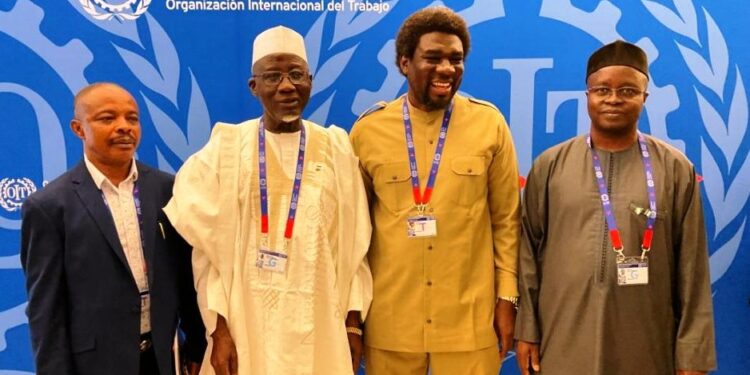The federal government has reaffirmed its dedication to promoting social justice and decent work, reiterating its partnership with the International Labour Organisation (ILO) during the ongoing 113th International Labour Conference in Geneva, Switzerland.
The minister of labour and employment, Muhammad Dingyadi, who led the Nigerian delegation to the global summit, made the pledge on Tuesday in response to the report presented by ILO director-general, Gilbert Houngbo, titled “Jobs, Rights and Growth: Reinforcing the Connection.”
Dingyadi noted that the director-general’s report aligned with President Bola Tinubu’s Renewed Hope Agenda, which aims to foster sustained socio-economic prosperity through job creation, inclusiveness, food security, poverty eradication, economic growth, access to capital, improved security, the rule of law and the fight against corruption.
“Nigeria shares the ILO’s vision of a just transition and recognises that sustainable development depends on inclusive economic growth, fair labour practices and strong democratic institutions,” the minister said.
According to a statement issued by the ministry’s head of press and public relations, Patience Onuobia, the minister announced Nigeria’s formal endorsement of the ILO’s Global Coalition for Social Justice.
He described the coalition as a key platform for building an equitable society in Nigeria and strengthening global partnerships for shared prosperity.
Highlighting the country’s recent progress, the Dingyadi cited the approval of a new nationally negotiated minimum wage in July 2024 as a milestone in advancing economic fairness and improving workers’ living standards.
He also outlined Nigeria’s intensified efforts to eliminate child labour and forced labour under its role as a pathfinder country in the ILO’s Alliance 8.7.
“Nigeria is actively reviewing its national legislation, empowering partners, strengthening institutions, and implementing community-based programmes to rescue and rehabilitate vulnerable children,” Dingyadi added.
Recognising that over 60% of Nigeria’s labour force operates within the informal economy, the minister detailed ongoing reforms to transition informal businesses into the formal sector through MSME support programmes, tax reforms, and digital registration initiatives. He said these efforts are complemented by expanded social protection coverage.
Dingyadi said the Nigerian government has ramped up investments in the digital economy and ICT training to prepare its workforce for the future, referencing initiatives such as the national digital Literacy framework.
The minister also highlighted Nigeria’s recent review of its National Employment Policy to align with the decent work agenda across all sectors.
Reaffirming Nigeria’s commitment to tripartism as a foundation for industrial peace, Dingyadi emphasised the institutionalisation of collective bargaining and regular consultation among labour stakeholders as a model for harmonious and inclusive policymaking.
The minister further called on all ILO member states to intensify cooperation in addressing shared challenges and to chart a collective path towards a fair, resilient and sustainable global future.



